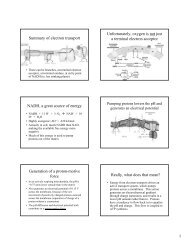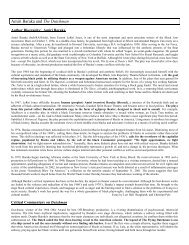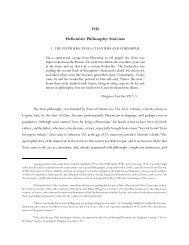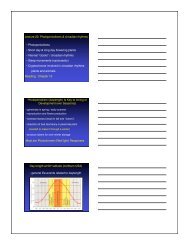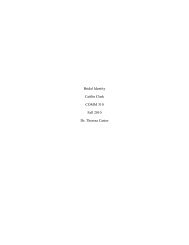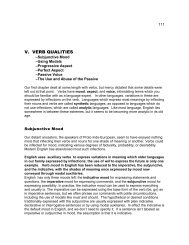Bibliography for Ancient Greek Philosophy - UW-Parkside: Help for ...
Bibliography for Ancient Greek Philosophy - UW-Parkside: Help for ...
Bibliography for Ancient Greek Philosophy - UW-Parkside: Help for ...
Create successful ePaper yourself
Turn your PDF publications into a flip-book with our unique Google optimized e-Paper software.
<strong>Bibliography</strong> <strong>for</strong> Stoicism<br />
Articles in Encyclopedia of <strong>Philosophy</strong><br />
“Stoicism,” “Zeno of Citium,” “Cleanthes,” “Chrysippus,” “Panaetius of Rhodes,” “Posidonius,” “Epictetus,” “Seneca,”<br />
“Marcus Aurelius.”<br />
Annas, J. (1993) The Morality of Happiness. New York and Ox<strong>for</strong>d.<br />
Arnold, E. Vernon (1911). Roman Stoicism. Cambridge: University Press. Repr. ed. 1958. Not terribly good, but a lot of out of the<br />
way in<strong>for</strong>mation on minor figures, and quotations of a lot of texts.<br />
Baldry, H.C. (1959). “Zeno’s ideal state.” Journal of Hellenic Studies 79: 3–15. A good account of Zeno’s Republic.<br />
________ (1965). The Unity of Mankind in <strong>Greek</strong> Thought. Cambridge.<br />
Bobzien, Susanne (1999). Determinism and Freedom in Stoic <strong>Philosophy</strong>. Ox<strong>for</strong>d: Clarendon Press.<br />
Brink, C.O. (1955). “Theophrastus and Zeno on nature and moral theory.” Phronesis 1: 123–45.<br />
Brunschwig, Jacques. (1994). Papers in Hellenistic <strong>Philosophy</strong>. Cambridge, England.<br />
Brunschwig, J. and M. Nussbaum (1993). Passions and Perceptions: Studies in the Hellenistic <strong>Philosophy</strong> of Mind. Proceedings of the Fifth<br />
Symposium Hellenisticum. Cambridge UK: Cambridge University Press.<br />
Cicero. On Fate. On the Nature of the Gods. On Divination. On Duties, On Ends, Academica, Tusculan Disputations.<br />
Cooper, John M. (1999). “Eudaimonism, the Appeal to Nature, and ‘Moral Duty’ in Stoicism,” in Reason and Emotion (Princeton:<br />
Princeton University Press) 427-448. "Posidonius on Emotions," 449-484. "<strong>Greek</strong> Philosophers on Euthanasia and<br />
Suicide," pp. 515-541.<br />
De Lacy, P. “The Stoic categories as methodological principles.” Transactions of the American Philological Association 76: 246–63.<br />
________ (1966). The Meaning of Stoicism. Cambridge, Mass.: Harvard University Press.<br />
R. Dilcher, Studies in Heraclitus (Hildesheim: Olms, 1995).<br />
H. Granger, “Argumentation and Heraclitus’ Book,” Ox<strong>for</strong>d Studies in <strong>Ancient</strong> <strong>Philosophy</strong> 26 (2006), 1-17.<br />
Engstrom, Stephen and Jennifer Whiting (eds.) (1996). Aristotle, Kant, and the Stoics. Cambridge: Cambridge University Press.<br />
Epictetus. Translations of G. Long (London: Bell, 1877) and P.E. Matheson (Ox<strong>for</strong>d: 1916) are best.<br />
Fortenbaugh, William W. (ed.) (1983). On Stoic and Peripatetic Ethics: The Work of Arius Didymus. New Brunswick and London:<br />
Transaction Books.<br />
Gould, Josiah B. (1970). The <strong>Philosophy</strong> of Chrysippus. Albany: State University of New York Press.<br />
*Hahm, D.E. (1977). The Origins of Stoic Cosmology. Columbus: Ohio State University Press. Sandbach claims it is important, but<br />
exaggerates the influence of Aristotle.<br />
Hicks, R.D. (1911). Stoic and Epicurean. London: Longmans Green.<br />
Hunt, H.A.K. “Some problems in the interpretation of Stoicism.” Journal of the Australasian Universities Language and Literature Association<br />
28: 165–77. On determinism and free will.<br />
Ierodiakonou, Katerina (1999). Topics in Stoic <strong>Philosophy</strong>. Ox<strong>for</strong>d: Clarendon Press.<br />
Inwood, Brad (1985). Ethics and Action in Early Stoicism. Ox<strong>for</strong>d: Clarendon Press.<br />
Jones, R.M. (1926). Classical Philology 21: 97–113. On Posidonius.<br />
________ (1932). Classical Philology 27: 113–35. On Posidonius<br />
Kerferd, G.B. (1972). “The search <strong>for</strong> personal identity in Stoic thought.” Bulletin of the John Rylands Library 55: 177–96.<br />
________ (). “Cicero and Stoic ethics.” In Cicero and Vergil, Studies in Honour of Harold Hunt, 60–74.<br />
Kidd, I.G. "Moral Actions and Rules in Stoic Ethics." In Rist, Ed., The Stoics. Pp.247-258.<br />
Lapidge, M. (1973). Phronesis 18: 240–78. On the elements in Stoicism.<br />
________ (1987). "Stoic Cosmology." In Rist (1987) 161-185.<br />
Long, A.A. (1967). “Carneades and the Stoic Telos.” Phronesis 12: 59–90.<br />
________ (1968a). “Aristotle’s legacy to Stoic ethics.” Bulletin of the Institute of Classical Studies 15: 72–85.<br />
________ (1968b). “The Stoic concept of evil.” Philosophical Quarterly 18 (1968) 329–43.<br />
________ (1987). "Emotion and Decision in Stoic Psychology." In Rist (1987)233-246 .<br />
________ (1986). Hellenistic <strong>Philosophy</strong> : Stoics, Epicureans, Sceptics.<br />
________ (1996). Stoic Studies. Cambridge: Cambridge University Press.<br />
Reesor, Nargaret E. (1987). "Necessity and Fate in Stoic <strong>Philosophy</strong>." In Rist (1987)187-202.<br />
Schofield, Malcolm and Gisela Striker (eds.) (1986). The Norms of Nature. Cambridge: Cambridge University Press.<br />
_______ (1991). The Stoic Idea of the City. Chicago and London: The University of Chicago Press, 1991.<br />
Striker, Gisela (1996). Essays on Hellenistic Epistemology and Ethics. Cambridge, England.<br />
Manning, C.E. (1973). “Seneca and the Stoics on the equality of the sexes.” Mnemosyne 26 (series iv): 170–7.<br />
More, P.E. (1923). Hellenistic Philosophies. Princeton. An excellent work, see pp. 94–171 <strong>for</strong> Epictetus.<br />
Murray, G. (1921). “The Stoic philosophy.” Essays and Addresses. London: Allen and Unwin.
Nock, A.D. (1959). Journal of Roman Studies 49: 1 ff. On Posidonius.<br />
+Nussbaum, Martha (1994). The Therapy of Desire. Princeton University Press. An excellent treatment of the religious/therapeutic<br />
side of Hellenistic thought.<br />
Pohlenz, M. (1948). Die Stoa. Göttingen:Vandenhoeck &Ruprecht. The best treatment, with no parallel in English.<br />
Reesor, M.E. (1954). “The Stoic concept of quality.” American Journal of Philology 75: 40–58.<br />
________ (1957). “The Stoic categories.” American Journal of Philology 78: 63–82.<br />
________ (1965). “Fate and possibility in early Stoic philosophy.” Phoenix 19: 285–97.<br />
Rist, ed. The Stoics.<br />
Robins, H.R. (1951). <strong>Ancient</strong> and Medieval Grammatical Theory. London. See pp. 25–36 on the Stoics.<br />
Sharples, R.W. (1996). Stoics, Epicureans and Skeptics : An Introduction to Hellenistic <strong>Philosophy</strong>. London and New York:<br />
Routledge,1996.V<br />
Solmsen, F. (1961). Cleanthes or Posidonius? The Basis of Stoic Physics. Amsterdam.<br />
Stanton, G.R. (1968). “The cosmopolitan ideas of Epictetus and Marcus Aurelius.” Phronesis 13: 183–95.<br />
Stough, Carlotte. “Stoic Determinism and Moral Responsibility,” in Rist () 203-231.<br />
Striker, Gisela (1996). “Origins of the Concept of Natural Law,” in Essays on Hellenistic Epistemology and Ethics (Cambridge: Cambridge<br />
University Press) 209-220. Also “Following Nature: A Study in Stoic Ethics,” 221-280, “The Role of Oikeiosis in Stoic<br />
Ethics,” 281-297. Also,“Plato’s Socrates and the Stoics,” 316-324.<br />
Todd, Robert B. (). "Monism and Immanence: The Foundations of Stoic Physics," In Rist () 137-160.<br />
________ (1973). “The Stoic common notions.” Symbolae Osloenses 48: 47–75.<br />
Toynbee, J.M.C. (1944). “Dictators and philosophers in the first century A.D.” Greece and Rome 13: 43–58.<br />
Watson, G. (1966). The Stoic Theory of Knowledge. Belfast.<br />
Wenley, R.M. (1924; 1925). Stoicism and its Influence. Boston: Marshall Jones; London: Harrap.<br />
Wirszubski, G. (1950). Pp. 138–53 in Libertas as a Political Ideal at Rome during the late Republic and Early Principate (Cambridge).<br />
Zeller, Eduard (1892). The Stoics, Epicureans and Skeptics. London: Longmans and Greeen. Once the standard work. Chiefly valuable<br />
now <strong>for</strong> Stoic ethics.<br />
Verbeke, G. (1983). The Presence of Stoicism in Medieval Thought. Washington.<br />
Colish, Marcia (1985). The Stoic Tradition from Antiquity to the Early Middle Ages. 2 vols. Leiden.<br />
Hellenistic <strong>Greek</strong> Religion<br />
Tarn, W.W. (1952). Hellenistic Civilisation. Third ed. New York: World Publishing Co.<br />
Cumont, Franz (1912). Astrology and Religion among the <strong>Greek</strong>s and Romans. G.P.Putnam’s and Sons.<br />
Grant, Frederick (1953). Hellenistic Religions. New York: Bobbs-Merrill.<br />
Hadas, Moses (1959). Hellenistic Culture, Fusion and Diffusion. Columbia University Press.<br />
MacGregor, G.H.C. and A.C. Purdy (1959). Jew and <strong>Greek</strong>. Edinburgh: Saint Andrew Press.<br />
Murray, Gilbert (1951). Five Stages of <strong>Greek</strong> Religion. New York: Doubleday.<br />
Nilsson, Martin (1948). <strong>Greek</strong> Piety. Ox<strong>for</strong>d: Clarendon Press.<br />
Nilsson, Martin (1940). <strong>Greek</strong> Popular Religion. New York: Columbia University Press.<br />
Nilsson, Martin (1949). A History of <strong>Greek</strong> Religion. Ox<strong>for</strong>d: Clarendon Press.<br />
Nock, A.D. (1933). Conversion. Ox<strong>for</strong>d University Press.<br />
Festugiere, A.–J. (1954). Personal Religion among the <strong>Greek</strong>s. Berkeley: University of Cali<strong>for</strong>nia Press.<br />
To note: Third century developments from contact with East, i.e cults of <strong>for</strong>tune and fate, Sun and planets as gods, orientalizing<br />
mystery religions. Second century, astrology, and mystery religions sometimes as escape from the planetary gods. Tendency<br />
to view the sect’s god as the only one, or at least the most powerful, others’ gods as aspects of one’s own, or subordinate<br />
to one’s own. So Isis cult: purification and lustration, raised to 8 th sphere to meet Isis, soul becomes free of influence of stars<br />
once free of the stain of sin, ascends to the goddess after death, freed from the body.<br />
<strong>Greek</strong> Medicine<br />
Sarton, George. Galen of Pergamon.<br />
Singer, Charles. A Short History of Medicine.
Taylor, H.O. <strong>Greek</strong> Biology and Medicine.<br />
Momigliano, A. (1976). Alien Wisdom: The Limits of Hellenization. Cambridge University Press.<br />
Fraenkel, H. (1975). Early <strong>Greek</strong> Poetry and <strong>Philosophy</strong>. Trans. M. Hadas and J. New York: Willis. Brace Jovanovich.<br />
Burdert, W. (1992). The Orientalizing Revolution: Near Eastern Influence on <strong>Greek</strong> Culture in the Early Archaic Age. Harvard University<br />
Press.<br />
Kierkegaard (1841). The Concept of Irony, with Continual Reference to Socrates. Trans. H.V. Hong and E.H. Hong. Princeton University<br />
Press, 1989.
BIBLIOGRAPHY<br />
The mention of a book or article in the bibliography can be taken as a recommendation <strong>for</strong> it. Included<br />
are good translations of primary sources, and the most interesting and important secondary sources. Most of<br />
the latter are here because they influenced my exposition, but some argue <strong>for</strong> interesting views with which I<br />
disagree. I have restricted myself <strong>for</strong> the most part to works in English.<br />
Aaboe, Asgar (1974). “Scientific astronomy in antiquity,” in The Place of Astronomy in the <strong>Ancient</strong> World, ed. F.R.<br />
Hodson (Ox<strong>for</strong>d) 21-42.<br />
Ackrill, J.L. (1981). Aristotle the Philosopher. Ox<strong>for</strong>d University Press.<br />
________ (1997). Essays on Plato and Aristotle. Ox<strong>for</strong>d University Press.<br />
Adkins, A.W.H. (1960). Merit and Responsibility. Ox<strong>for</strong>d. An excellent treatment of <strong>Greek</strong> ethical thought<br />
be<strong>for</strong>e the fourth century, working from literary texts. Its conclusions may be somewhat overdrawn,<br />
though many critics seem to overreact, and insist on misunderstanding them. For judicious correction,<br />
see Lloyd-Jones (1971) and A.A. Long (1970).<br />
________ (1970). From the Many to the One: A Study of Personality and Views of Human Nature in the Context of<br />
<strong>Ancient</strong> <strong>Greek</strong> Society, Values, and Beliefs. Cornell University Press.<br />
________ (1972). Moral Values and Political Behavior in <strong>Ancient</strong> Greece.<br />
Algra, Keimpe (1999). “The Beginnings of Cosmology.” Chapter 3 in A. A. Long (1999), 45–65.<br />
________, Jonathan Barnes, Jaap Mansfield, and Malcolm Schofield (eds.) (1999). The Cambridge History of<br />
Hellenistic <strong>Philosophy</strong>. Cambridge University Press.<br />
Allan, D.J. (2 nd ed. 1970). The <strong>Philosophy</strong> of Aristotle. Ox<strong>for</strong>d University Press.<br />
Allen, Reginald E. (ed.) (1965). Studies in Plato’s Metaphysics. London and New York: Routledge and Kegan<br />
Paul Ltd and The Humanities Press.<br />
________ (1970). Plato’s `Euthyphro’ and the Earlier Theory of Forms. London: Routledge and Kegan Paul, New<br />
York: Humanities Press.<br />
________ (1980). Socrates and Legal Obligation. Minneapolis: University of Minnesota Press. Contains a<br />
translation of the Crito and Apology along with an excellent and well written discussion of Socrates’s<br />
philosophy of law.<br />
Annas, Julia E. (1981). An Introduction to Plato’s Republic. Ox<strong>for</strong>d.<br />
________ (1991). “Epicurus’s <strong>Philosophy</strong> of Mind.” In Everson ed. (1991).<br />
________ (1992). Hellenistic <strong>Philosophy</strong> of Mind. Berkeley, Cali<strong>for</strong>nia: University of Cali<strong>for</strong>nia Press.<br />
Anthes, Rudolf (1961). “Mythology in <strong>Ancient</strong> Egypt.” In Mythologies of the <strong>Ancient</strong> World, edited by Samuel<br />
Noah Kramer (Garden City, New York: Doubleday), pp. 15-92. An interesting overview, though his<br />
remarks about the general nature of Egyptian myths are unduly influenced by the notion of<br />
“mythopoeic thought.”<br />
Anton, John P and George L. Kustas (eds.) (1971). Essays in <strong>Ancient</strong> <strong>Greek</strong> <strong>Philosophy</strong>. Vol 1. Albany, New<br />
York: State University of New York Press.<br />
________ and A. Preuss (eds.) (1983). Essays in <strong>Ancient</strong> <strong>Greek</strong> <strong>Philosophy</strong>. Vol 2. Albany, New York: State<br />
University of New York Press.<br />
Aristotle [4th century BCE]. The Complete Works of Aristotle: The Revised Ox<strong>for</strong>d Translation. Edited by Jonathan<br />
Barnes. 2 vols. Princeton, New Jersey: Princeton University Press, 1984.<br />
Aristoxenus [4 th century BCE]. The Harmonics of Aristoxenus. Edited and translated with notes by Henry S.<br />
Macran. Ox<strong>for</strong>d: Clarendon Press, 1902.<br />
Armstrong, A.H. (1959). An Introduction to <strong>Ancient</strong> <strong>Philosophy</strong>. Third edition, revised. Newman Press.<br />
Revision of 2d edition edition of 1949. Paperback reprint, Beacon Press 1965. A readable and
insightful short introduction, though somewhat dated.<br />
________, ed. (1967). The Cambridge History of Later <strong>Greek</strong> and Early Medieval <strong>Philosophy</strong>. Cambridge University<br />
Press.<br />
Armstrong, Karen (2005). A Short History of Myth. New York: Canongate.<br />
Bailey, C. (1928). The <strong>Greek</strong> Atomists and Epicurus: A Study. Ox<strong>for</strong>d. Reprint ed., Russell, 1964.<br />
Baldry, H.C. (1932). “Embryological Analogies in Pre-Socratic <strong>Philosophy</strong>.” Classical Quarterly 26: 27-34.<br />
Barnes, Jonathan (1979). The PreSocratic Philosophers. 2 vols. London. Revised edition in one volume,<br />
London: Methuen, 1982. A philosophically lively, but still scholarly, discussion.<br />
________ (1985). “Theophrastus and hypothetical syllogistic”, in Fortenbaugh, W. W., Huby, P. M. & Long<br />
A. A., edd. (1985) Theophrastus of Eresus: On his Life and Work, RUSCH 2 (New Brunswick/Ox<strong>for</strong>d)<br />
125–41<br />
________ (1988). Reply to Burnyeat (1988), in Proceedings of the Aristotelian Society. Supplementary volume<br />
44, 193–206.<br />
Barnes, Jonathan, Michael Schofield and Richard Sorabji (1975–79). Articles on Aristotle. 4 vols. London.<br />
Barnes, Jonathan, ed. (1995).The Cambridge Companion to Aristotle. Cambridge University Press.<br />
Barton, Carlin. (1993). The Sorrows of the <strong>Ancient</strong> Romans: The Gladiator and the Monster. Princeton University<br />
Press.<br />
Bennett, Jonathan (1964). Rationality. An Essay Towards an Analysis. London: Routledge and Kegan Paul. A<br />
sophisticated examination by a first-rate philosopher of what it is to be intelligent, and rational.<br />
Benson, Hugh H., ed. (1992). Essays on the <strong>Philosophy</strong> of Socrates. New York and Ox<strong>for</strong>d: Ox<strong>for</strong>d University<br />
Press. A good collection of the most important articles published since Vlastos (1971a).<br />
________ (1997). Socrates and the Beginning of Moral <strong>Philosophy</strong>.” In Taylor (1997), Routledge History of<br />
<strong>Philosophy</strong>: Vol. 1: From the Beginnings to Plato.<br />
________ ed. (2006). A Companion to Plato. Blackwell Publishing.<br />
Bett, R. (2000), Pyrrho, his antecedents, and his legacy, (Ox<strong>for</strong>d: Ox<strong>for</strong>d University Press).<br />
________ (2002). “Timon of Phlius.” In The Stan<strong>for</strong>d Encyclopedia of <strong>Philosophy</strong>. Edited by Edward N. Zalta.<br />
(http://plato.stan<strong>for</strong>d.edu/).<br />
Bevan, Edwyn (1913). Stoics and Skeptics. Clarendon Press. Repr. Cambridge: W. Heffer and Sons, Ltd., 1959,<br />
1965. Four lectures, two on the Stoics, one on Posidonius, one on the Skeptics. A brief, readable and<br />
intelligent consideration in the old style, arguing <strong>for</strong> the superiority of Christianity.<br />
________ (1923). “Hellenistic Popular <strong>Philosophy</strong>.” In The Hellenistic Age (Cambridge University Press),<br />
79–107.<br />
Bobonich, Christopher (2002). Plato’s Utopia Recast: His Later Ethics and Politics. Clarendon Press.<br />
________ (2008). “Plato’s Politics.” In Fine (2008).<br />
Bodnar, Istvan M. (2001). “Atomic Independence and Indivisibility.” Ch. 7 in Preus (2001).<br />
Brandwood, Leonard (1992). “Stylometry and chronology.” In Kraut (1992). An excellent summary of<br />
stylometric research on Plato’s dialogues.<br />
Brickhouse, Thomas, and Nicholas D. Smith (1985). “The <strong>for</strong>mal charges against Socrates.” Journal of the<br />
History of <strong>Philosophy</strong> 23: 457-81. Reprinted in Benson (1992) 14-34.<br />
________ (1994). Plato’s Socrates. Ox<strong>for</strong>d University Press.<br />
Brittain, C. (2001). Philo of Larissa. Ox<strong>for</strong>d University Press.<br />
________ (2005). “Arcesilaus.” In The Stan<strong>for</strong>d Encyclopedia of <strong>Philosophy</strong>. Edited by Edward N. Zalta.<br />
(http://plato.stan<strong>for</strong>d.edu).<br />
Broadie, Sarah (1999). “Rational Theology.” Chapter 10 in A. A. Long (1999) 205–224.<br />
Burkert, Walter (1972). Lore and Science in <strong>Ancient</strong> Pythagoreanism. Cambridge, Mass. Translated by E.L.<br />
Minar, Jr. from the German edition of 1962. Superseded everything previously written on the
subject.<br />
________ (2008). “Prehistory of Presocratic <strong>Philosophy</strong> in an Orientalizing Context.” In Curd (2008).<br />
Burnet, John (1915–16). “The Socratic doctrine of the soul.” Proceedings of the British Academy 7: 235–59.<br />
Reprinted in his Essays and Addresses (London, 1929): 126–62.<br />
Burnyeat, Myles F. (1976). “Protagoras and self-refutation in later <strong>Greek</strong> <strong>Philosophy</strong>.” Philosophical Review 91:<br />
3-40. Reprinted in Everson (1990).<br />
________ (1980). “Can the Sceptic Live His Scepticism?” In Schofield, Burnyeat and Barnes (1980) 20–53.<br />
________(1981). “Aristotle on understanding knowledge,” in E. Berti, 97–139.<br />
________, ed. (1983). The Skeptical Tradition. Berkeley: University of Cali<strong>for</strong>nia Press.<br />
________(1988). “Socrates and the jury: Paradoxes in Plato’s distinction between knowledge and true belief.”<br />
Proceedings of the Aristotelian Society. Supplementary volume 44, 173–206.<br />
________(1990). The Theaetetus of Plato. Indianapolis: Hackett Publishing Company. M.J. Levett’s translation,<br />
revised, with a book length introduction.<br />
Burnyeat, M. and M. Frede, eds. (1997). The Original Sceptics: A Controversy. Indianapolis: Hackett Publishing<br />
Company.<br />
Calagero, G. (1957). “Gorgias and the Socratic principle ‘Nemo sua sponte peccat.” Journal of Hellenic Studies<br />
1: 12-17. Seems to me to get it more or less right, but <strong>for</strong> criticism, see Coulter (1964).<br />
Canary, Robert and Henry Kozicki (1978). The Writing of History: Literary Form and Historical Understanding.<br />
University of Wisconsin Press.<br />
Cherniss, H. (1935). Aristotle's Criticism of Presocratic <strong>Philosophy</strong> Baltimore: Johns Hopkins Press.<br />
________ (1944). Aristotle’s Criticism of Plato and the Academy. Baltimore: Johns Hopkins Press.<br />
Clark, R.T. Rundle (1963). Myth and Symbol in <strong>Ancient</strong> Egypt.<br />
Clay, Diskin (1988). “Reading the Republic.” In Griswold (1988): 19-34.<br />
Cochrane, Charles Norris (1940). Christianity and Classical Culture. Ox<strong>for</strong>d University Press. Paperback edition,<br />
1957.<br />
Cohen, S. Marc (1971). “Socrates on the Definition of Piety.” In Vlastos (1971a) 158-176.<br />
Cohen, Morris and I.E. Drabkin (1948). Source Book in <strong>Greek</strong> Science. New York: McGraw Hill. Reissue:<br />
Harvard: 1966.<br />
Cooper, John (1985). “Plato, Isocrates, and Cicero on the independence of oratory from philosophy.”<br />
Proceedings of the Boston Area Colloquium in <strong>Ancient</strong> <strong>Philosophy</strong>, 1: 77–96.<br />
________ (1970). “Plato on Sense Perception and Knowledge (Theaetetus 184-186).” Phronesis 15, 123-46.<br />
Reprinted in Fine, ed. (1999)<br />
Corey, David Dwyer (2002). “The <strong>Greek</strong> Sophists: Teachers of Virtue,” Ph.D. dissertation at Louisiana State<br />
University.<br />
Corn<strong>for</strong>d, F.M. (1926). “Mystery Religions and Pre-Socratic <strong>Philosophy</strong>.” In Cambridge <strong>Ancient</strong> History, vol.<br />
IV, Chapter 15. Cambridge.<br />
________ (1952). Principium Sapientiae: The Origins of <strong>Greek</strong> Philosophical Thought. Corn<strong>for</strong>d’s last work,<br />
solidly establishing his pioneering ef<strong>for</strong>ts to connect the earliest <strong>Greek</strong> philosophical speculation to its<br />
mythical background. His readings, brilliant as they are, fail to connect <strong>Greek</strong> thought to its<br />
ideological functions. For this, see Vernant (1983).<br />
________ (1934). Plato’s Theory of Knowledge. Routledge and Kegan Paul, Ltd., London. A translation and<br />
commentary on the Sophist and the Theaetetus.<br />
________ (1937). Plato’s Cosmology. Routledge and Kegan Paul, Ltd., London. A translation and commentary<br />
on the Timaeus.<br />
________ ( ). Plato and Parmenides. A translation and commentary on the Parmenides.<br />
Coulter, J.A. (1964). “The Relation of the Apology of Socrates to Gorgias’ Defense of Palamedes and Plato’s
critique of Gorgianic rhetoric.” Harvard Studies in Classical Philology: 269-303. A criticism of Calagero<br />
(1957).<br />
Couprie, Dirk L. (2003). “The Discovery of Space: Anaximander’s Astronomy.” In Anaximander in Context: New<br />
Studies in the Origins of <strong>Greek</strong> <strong>Philosophy</strong>. Albany: State University of New York Press.<br />
__________ (2001). Article in the Internet Encyclopedia of <strong>Philosophy</strong> (www.utm.edu/research/iep),<br />
“Anaximander (c. 610-546 BCE).”<br />
Creed, J.L. (1973). "Moral Values in the Age of Thucydides." Classical Quarterly 23, 213-231.<br />
Crombie, I.M. (1962, 1963). An Examination of Plato’s Doctrines. Vol. I. Plato on Man and Society. Vol. 2: Plato<br />
on Knowledge and Reality. London. An excellent work, though rather repetitive and long-winded, and<br />
often less philosophically penetrating than the later works cited here.<br />
________ (1964). Plato: The Midwife’s Apprentice. London: Routledge and Kegan Paul. A well-written<br />
summary of the results of Crombie (1962, 1963).<br />
Cross, R.C. and Woozley, A.D. (1964). Plato’s Republic: A Philosophical Commentary. London: Macmillan.<br />
Somewhat oversimplified commentary.<br />
Couissin, P. (1929), “Le Stoicisme de la nouvelle Academie,” Revue d'histoire de la philosophie 3: 241-76, tr. by<br />
Jennifer Barnes and M. Burnyeat as “The Stoicism of the New Academy,” in Burnyeat, ed. (1983)<br />
31-63.<br />
Crivelli, Paolo (2008). “Plato’s <strong>Philosophy</strong> of Language.” In Gail Fine (2008).<br />
Curd, Patricia (1998). The Legacy of Parmenides: Eleatic Monism and Later Presocratic Thought. Princeton University<br />
Press.<br />
Curd, Patricia, and Graham, Daniel (2008). The Ox<strong>for</strong>d Handbook of Presocratic <strong>Philosophy</strong>. Ox<strong>for</strong>d University<br />
Press.<br />
Dancy, R. M. (1989). “Thales, Anaximander, and infinity.” Apeiron 22,149-190.<br />
________ (1991). Two Studies in the Early Academy. Albany, NY: SUNY Press.<br />
________ (2003). “Speusippus.” In The Stan<strong>for</strong>d Encyclopedia of <strong>Philosophy</strong>. Edited by Edward N. Zalta.<br />
(http://plato.stan<strong>for</strong>d.edu/entries/speusippus).<br />
________ (2004). Plato’s Introduction of Forms. Cambridge University Press.<br />
________ (2003; rev. 2008). “Xenocrates.” In The Stan<strong>for</strong>d Encyclopedia of <strong>Philosophy</strong>. Edited by Edward N.<br />
Zalta. (http://plato.stan<strong>for</strong>d.edu/entries/xenocrates).<br />
Dannhauser, Werner J. (1974). Nietzsche’s View of Socrates. Ithaca, New York: Cornell University Press.<br />
Dennett, Daniel C. (1995). Darwin’s Dangerous Idea. Simon & Schuster. A Philosopher’s well–in<strong>for</strong>med<br />
account of evolutionary theory, discussing in the last chapters the evolution of mind and thinking.<br />
________ (2006). Breaking the Spell. Penguin Books. A sophisticated account of religion from an evolutionary<br />
point of view.<br />
Denyer, Nicholas (1991). Language, Thought and Falsehood in <strong>Ancient</strong> <strong>Greek</strong> <strong>Philosophy</strong>. London and New York:<br />
Routledge.<br />
Devereux, Daniel T. (1994). “Separation and immanence in Plato’s theory of <strong>for</strong>ms.” Ox<strong>for</strong>d Studies in <strong>Ancient</strong><br />
<strong>Philosophy</strong> 12, 63–90. Reprinted in Fine (1999).<br />
________ (2008). “Socratic Ethics and Moral <strong>Philosophy</strong>.” In Fine (2008).<br />
DeWitt, Norman Wentworth (1954). Epicurus and His <strong>Philosophy</strong>. University of Minnesota Press.<br />
Dicks, T.R. “Thales.” Classical Quarterly 9 (1959) 294-309.<br />
Dillon, John (1977; rev. ed. 1996). The Middle Platonists: A Study of Platonism, 80 B.C. to A.D. 220. Duckworth.<br />
________ (1993). Alcinous: The Handbook of Platonism, translated with an introduction and commentary. Ox<strong>for</strong>d:<br />
Clarendon Press.<br />
________ (2003). The Heirs of Plato: A Study of the Old Academy (347-274 B.C.). Ox<strong>for</strong>d: Clarendon Press; New<br />
York: Ox<strong>for</strong>d University Press.
Dilthey, Wilhelm (1957). Dilthey’s <strong>Philosophy</strong> of Existence: Introduction to Weltanschauungslehre. New York:<br />
Bookman Associates. Translation of The Types of World Views and Their Unfolding Within the Metaphysical<br />
Systems, Gesammelte Schriften VIII 75–118, by William Kluback and Martin Weinbaum.<br />
Dio Cocceianus Chrysostomus [ca. 40–120 CE]. Dio Chrysostom. Discourses. <strong>Greek</strong> edition with translation by<br />
J.W. Colhoon. 5 vols. The Loeb Classical Library. Harvard University Press. 1932.<br />
Diogenes Laertius [3d century CE]. Diogenes Laertius. Lives of the Eminent Philosophers. <strong>Greek</strong> edition with<br />
translation by R.D. Hicks. 2 vols. The Loeb Classical Library. Harvard University Press. 1925<br />
(revision of vol. 1, 1938). A set of biographies including many quotations from earlier works not<br />
otherwise preserved.<br />
Dobson, J.F. (1918). “The Posidonius myth.” Classical Quarterly 12, 179 ff.<br />
Dodds, E.R. (1928). The Parmenides and the origins of the Neoplatonic ‘One’.” Classical Quarterly 22, 129–42<br />
________ (1951). The <strong>Greek</strong>s and the Irrational. University of Cali<strong>for</strong>nia Press: Berkeley. Reprint, Peter<br />
Smith, 1986.<br />
Douglas, Mary (1966). Purity and Danger. An Analysis of Concepts of Pollution and Taboo. Routledge and Kegan<br />
Paul.<br />
Dudley, D.R. (1937) A History of Cynicism, London: Methuen.<br />
Düring, I. and G.E.L. Owen, eds. (1960). Aristotle and Plato in the Mid-Fourth Century. Göteborg.<br />
Edelstein, Ludwig (1936). “The philosophical system of Poseidonius.” American Journal of Philology 57: 286 ff.<br />
Edwards, C.H., Jr. (1979). The Historical Development of the Calculus. New York: Springer Verlag. Chapter one<br />
provides a conceptually sophisticated review of <strong>Greek</strong> mathematics.<br />
Eliade, Mircea (1964). Shamanism: Archaic Techniques of Ecstasy. Princeton, N.J.: Princeton University Press.<br />
A detailed study of Shamanism. Claims that it lies behind Indian meditative religions, Taoism in China,<br />
Orphism in Greece, and Nordic mythology.<br />
Ellis, Havelock (1963). Preface to Plato.<br />
Everson, Stephen, ed. (1990). Epistemology. Companions to <strong>Ancient</strong> Thought 1. Cambridge: Cambridge<br />
University Press. An excellent collection of philosophically sophisticated essays on <strong>Ancient</strong> theory of<br />
knowledge.<br />
________ ed. (1991). Psychology. Companions to <strong>Ancient</strong> Thought 2. Cambridge: Cambridge University<br />
Press. An excellent collection of philosophically sophisticated essays on <strong>Ancient</strong> philosophy of mind.<br />
Ferrari, G.R.F. ed. (2007). The Cambridge Companion to Plato’s Republic. Cambridge: Cambridge University<br />
Press.<br />
Field, G.C. (1930). Plato and his Contemporaries. London: Methuen & Co.<br />
Fine, Gail (1978). “Knowledge and Belief in Republic V.” Archiv für Geschichte der Philosophie 60: 121-139.<br />
________ (1979a). “Knowledge and logos in the Theaetetus.” Philosophical Review 88: 366-97. Reprinted in<br />
Fine (2003).<br />
________ (1979b). “False belief in the Theaetetus.” Phronesis 24, 70-80. Reprinted in Fine (2003).<br />
________ (1980). “One over many.” Philosophical Review 89.<br />
________ (1984). “Separation.” Ox<strong>for</strong>d Studies in <strong>Ancient</strong> <strong>Philosophy</strong> 2: 31-87. Reprinted in Fine (2003). On<br />
Aristotle’s contention that Plato “separated” the Forms from particulars, while Socrates did not.<br />
________ (1986). “Immanence.” Ox<strong>for</strong>d Studies in <strong>Ancient</strong> <strong>Philosophy</strong> 4: 71-97. Reprinted in Fine (2003).<br />
________ (1994). “Protagorean Relativisms.” Boston Area Colloquium in <strong>Ancient</strong> <strong>Philosophy</strong> 10 (Latham, Md:<br />
University Press of America), 211-43. Reprinted in Fine (2003).<br />
________ (1996). “Conflicting appearances: Theaetetus 153d-154b.” In C. Gill and M. McCabe, Form and<br />
Argument in Late Plato. Ox<strong>for</strong>d: Clarendon Press. Reprinted in Fine (2003).<br />
________ (1997). “Forms as causes: Plato and Aristotle.” In A. Graeser, ed. (1997), Mathematics and<br />
Metaphysics (Bern: Haupt), 69–112. Reprinted in Fine (2003)
________ (1998). “Plato’s refutation of Protagoras in the Theaetetus.” Apeiron 32, 201-34. Reprinted in Fine<br />
(2003).<br />
________ (1990). “Knowledge and belief in Republic V-VII.” In Everson (1990): 85-115. Reprinted in Fine<br />
(1999).<br />
________ (1992). “Inquiry in the Meno.” In Kraut (1992): 200–226. Reprinted in Fine (2003).<br />
________ ed. (1999). Plato 1: Metaphysics and Epistemology. Ox<strong>for</strong>d Readings in <strong>Philosophy</strong>. Ox<strong>for</strong>d: Ox<strong>for</strong>d<br />
University Press. A first-rate collection of essays by various authors.<br />
________ (2003). Plato on Knowledge and the Forms: Selected Essays. Ox<strong>for</strong>d.<br />
________ (2008). The Ox<strong>for</strong>d Handbook of Plato. Ox<strong>for</strong>d.<br />
Fine, John (1983). The <strong>Ancient</strong> <strong>Greek</strong>s: A Critical History. Harvard University Press. In my view, the best political<br />
history of <strong>Ancient</strong> Greece available.<br />
Finkelberg, Aryeh (1986). “The Cosmology of Parmenides.” The American Journal of Philology 107: 303–317.<br />
________ (1990). “Studies in Xenophanes.” Harvard Studies in Classical Philology 93: 103-167.<br />
________ (1996). “Plato’s Method in the Timaeus.” The American Journal of Philology 117: 391-409.<br />
________ (1997). “Xenophanes’ Physics, Parmenides’ Doxa, and Empedocles’ Theory of Cosmogonical<br />
Mixture.” Hermes 125: 1-16.<br />
________ (1998). “On the History of the <strong>Greek</strong> ‘Cosmos’.” Harvard Studies in Classical Philology 98, 103-136.<br />
________ (1999). “Being, Truth and Opinion in Parmenides.” Archiv fur Geschichte der Philosophie 81, 233–248.<br />
Finley, M.I. (1956). The World of Odysseus. Particularly interesting <strong>for</strong> Finley’s account of views concerning<br />
virtue in the ninth century B.C.E. Finley is a solid historian not much given to nonsense, and always<br />
refreshing to read.<br />
Fraenkel, Herman (1925). “Xenophanes’s empiricism and his critique of knowledge.” In Mourelatos (1974)<br />
118-131. Original German version in Hermes 60 (1925) 174-92, as Part II of “Xenophanes-studien.”<br />
Frank<strong>for</strong>t, Henri, ed. (1946). The Intellectual Adventure of <strong>Ancient</strong> Man. Chicago: University Press. Reprint ed.,<br />
as Be<strong>for</strong>e <strong>Philosophy</strong>. Harmondsworth: Penguin, 1949. A good overview of the mythological thought<br />
of Egypt and Mesopotamia. Chapters on Mesopotamia by Thorkild Jacobsen.<br />
________ (1948). Kingship and the Gods. Chicago: University of Chicago Press. A detailed, perceptive, and<br />
scholarly study of kingship and its relation to the religious world views of Egypt and Mesopotamia.<br />
Frankfurt, Harry G. (1971). “Freedom of the will and the concept of a person.” Journal of <strong>Philosophy</strong> 68.<br />
Reprinted in The Importance of What We Care About. Cambridge, England: Cambridge University Press,<br />
1988.<br />
Frede, Dorothea (1992). “Disintegration and Restoration: Pleasure and Pain in Plato’s Philebus.” In Kraut<br />
(1992) 425-463.<br />
Frede, Michael (1987a). Essays in <strong>Ancient</strong> <strong>Philosophy</strong>. Minneapolis: University of Minnesota Press.<br />
________ (1987b). “Numenius,” in Aufstieg und Niedergang der römischen Welt, 36 (2): 1034–1075.<br />
________ (1994). “Celsus”, in Aufstieg und Niedergang der römischen Welt, 36 (2): 5183–5213.<br />
Fritz, K. von (1943). “Noos and noein in the Homeric poems.” Classical Philology 38: 79-93.<br />
________ (1945-6). “Nous, noein and their derivatives in Presocratic philosophy.” Classical Philology 40:<br />
223–242, 41: 12–34.<br />
Furley, David J. (1967a). “Parmenides of Elea.” In Paul Edwards, Encyclopedia of <strong>Philosophy</strong>, vol. 6, 47-51.<br />
________ (1967b). Two Studies in the <strong>Greek</strong> Atomists. Princeton. A philosophically sophisticated treatment.<br />
Furley, David J. and R.E. Allen (eds.) (1970, 1975). Studies in Pre-Socratic <strong>Philosophy</strong>. 2 vols. London. An<br />
excellent collection of classic papers.<br />
Furth, Montgomery (1968). “Elements of Eleatic ontology.” Journal of the History of <strong>Philosophy</strong> 6: 111-132.<br />
Gallop, David (1975). Plato: Phaedo. Translated with notes. Clarendon Press: Ox<strong>for</strong>d.<br />
Geach, Peter (1966). “Plato’s Euthyphro, an analysis and commentary,” Monist 50:3, 369–382.
Gerson, Lloyd P. (1996). The Cambridge Companion to Plotinus. Cambridge University Press.<br />
________ (2010). The Cambridge History of <strong>Philosophy</strong> in Late Antiquity. Cambridge University Press.<br />
Giannantoni, G. (1990). Socratis et Socraticorum Reliquiae. Second edition. Naples.<br />
Giddens, A. (1985). The Nation State and Violence. Polity Press.<br />
Gill, Christopher, and T.P. Wiseman (eds.) (1993). Lies and Fiction in the <strong>Ancient</strong> World. Austin: University of<br />
Texas Press.<br />
Gill, Mary Louise (1996). Plato: Parmenides. Translated with Paul Ryan, with Introduction. Hackett Publishing<br />
Company: Indianapolis, Indiana.<br />
Gill, Mary Louise and Pierre Pellegrin, eds. (2006). A Companion to <strong>Ancient</strong> <strong>Philosophy</strong>. Blackwell Publishing.<br />
Glucker, John (1978). Antiochus and the Late Academy. Gottingen: Vandenhoeck und Ruprecht.<br />
Gomperz, Theodor (1896). <strong>Greek</strong> Thinkers. Translated by Laurie Magnus, London: John Murray, 1906.<br />
Goodenough, Ward H. (1990). “Evolution of the Human Capacity <strong>for</strong> Beliefs.” American Anthropologist 92(3)<br />
597-612.<br />
Gosling, J.C.B. (1975). Plato: Philebus. Translated with Notes and Commentary. Clarendon Press, Ox<strong>for</strong>d.<br />
Gracia, Jorge J.E. (1992). <strong>Philosophy</strong> and Its History. Issues in Philosophical Historiography. State University of New<br />
York Press. A sensible and thorough consideration of the issues by a practicing historian of philosophy.<br />
Graham, Daniel (1987). Aristotle’s Two Systems. Ox<strong>for</strong>d.<br />
Graham, D. W. (1994). “The Postulates of Anaxagoras.” Apeiron 27: 77–121.<br />
________ (2008). “Leucippus’s Atomism.” In Curd and Graham (2008).<br />
Grene, Margaret (1963). A Portrait of Aristotle. Chicago.<br />
Griswold, Charles L. (ed.) (1988). Platonic Writings, Platonic Readings. New York, New York: Routledge,<br />
Chapman and Hall.<br />
Grote, George (1850). History of Greece. 2d ed. Chapter 47: The Drama–Rhetoric and Dialectics–The<br />
Sophists. London: John Murray. Reprinted in Irwin (1995) 2:2–112.<br />
Guthrie, Kenneth Sylvan (1917). Numenius of Apamea: The Father of Neo-Platonism. London: George Bell and<br />
Sons.<br />
Guthrie, W.K.C. (1933-34). “The development of Aristotle’s theology.” Classical Quarterly 27: 162-171, 28:<br />
90–98.<br />
________ (1949). The <strong>Greek</strong>s and their Gods. 1949. A sound and scholarly general account of <strong>Greek</strong> Olympian<br />
theology, though somewhat out-dated on some topics.<br />
________ (1952). Orpheus and <strong>Greek</strong> Religion: A Study of the Orphic Movement. 2d. rev. ed. 1952.<br />
________ (1962-81). A History of <strong>Greek</strong> <strong>Philosophy</strong>. 6 vols. Cambridge. I: The Earlier Presocratics and The<br />
Pythagoreans (1962). II: The Presocratic Tradition from Parmenides to Democritus (1965). III: The<br />
Fifth-century Enlightenment (1969). IV: Plato. The Man and His Dialogus: Earlier Period (1975).<br />
V: The Later Plato and the Academy (1978). VI: Aristotle: An Encounter (1981). A thorough and<br />
careful work, reviewing all important previous scholarship. Exhaustive bibliographies.<br />
Hadot, P. (1968). Porphyre et Victorinus. Paris.<br />
Hahn, Robert (2003). “Proportions and Numbers in Anaximander and <strong>Greek</strong> Thought.” In Anaximander in<br />
Context: New Studies in the Origins of <strong>Greek</strong> <strong>Philosophy</strong>. Albany: State University of New York Press.<br />
Hankinson, R.J. (1991). “<strong>Greek</strong> Medical Models of the Mind.” In Everson (1991) 194–217.<br />
Hare, R.M. (1982). Plato. Past Masters Series. Ox<strong>for</strong>d University Press.<br />
Hasper, Pieter (1999). “The Foundations of Presocratic Atomism.” Ox<strong>for</strong>d Studies in <strong>Ancient</strong> <strong>Philosophy</strong> XVII,<br />
1–14.<br />
Heath, Sir Thomas (1908). Thirteen Books of Euclid. 3 vols. Ox<strong>for</strong>d. Translation with exhaustive historical and<br />
scholarly commentary. A rich source <strong>for</strong> ancient geometry in general.<br />
________ (1921). History of <strong>Greek</strong> Mathematics. 2 vols. Ox<strong>for</strong>d. The authoritative reference, very richly
documented.<br />
Hegel, G.W.F. (1985). Hegel’s Introduction to the Lectures on the History of <strong>Philosophy</strong>. Translated by T.M. Knox<br />
and A.V.Miller. Clarendon Press, Ox<strong>for</strong>d.<br />
Heidel, W.A. (1906). “The dine in Anaximander and Anaximenes.” Classical Philology 1: 279-282.<br />
Herman, A.L. (1983). An Introduction to Buddhist Thought: A Philosophic History of Indian Buddhism. London,<br />
Lanham, Maryland: University Press of America.<br />
Horton, R. (1970). “African traditional thought and western science.” In Wilson (1970), 137-171. An<br />
abbreviated <strong>for</strong>m of an article in Africa 37 (1967) 50-71, 155-187.<br />
Huffman, C. A. (1993). Philolaus of Croton: Pythagorean and Presocratic. Cambridge: Cambridge University Press.<br />
(<strong>Greek</strong> texts of the fragments and testimonia with translations and commentary in English.)<br />
________ (1988). “The Role of Number in Philolaus’ <strong>Philosophy</strong>.” Phronesis 33: 1-30.<br />
________ (2001). “The Philolaic Method: The Pythagoreanism behind the Philebus.” In Essays in <strong>Ancient</strong> <strong>Greek</strong><br />
<strong>Philosophy</strong> VI: Be<strong>for</strong>e Plato, A. Preus (ed.) (Albany: State University of New York Press) 67-85.<br />
________ (2002). “Archytas and the Sophists,” in Presocratic <strong>Philosophy</strong>: Essays in Honour of Alexander Mourelatos,<br />
Victor Caston and Daniel W. Graham (eds.) (Aldershot: Ashgate) 251-270.<br />
________ (2004). Archytas of Tarentum: Pythagorean, Philosopher and Mathematician King. Cambridge: Cambridge<br />
University Press.<br />
________ (2008). “Philolaus.” The Stan<strong>for</strong>d Encyclopedia of <strong>Philosophy</strong> (Fall 2011 Edition), Edward N. Zalta<br />
(ed.), URL = .<br />
________ (2011). “Archytas.” The Stan<strong>for</strong>d Encyclopedia of <strong>Philosophy</strong> (Fall 2011 Edition), Edward N. Zalta<br />
(ed.), URL = .<br />
Huggett, Nick (1999). Space from Zeno to Einstein: Classic Readings with a Contemporary Commentary. Cambridge,<br />
MA: MIT Press.<br />
________ (2010). “Zeno’s Paradoxes.” The Stan<strong>for</strong>d Encyclopedia of <strong>Philosophy</strong> (Fall 2011 Edition), Edward<br />
N. Zalta (ed.), URL = .<br />
Hussey, Edward (1982). “Epistemology and meaning in Heraclitus.” In Language and Logos: Studies in <strong>Ancient</strong><br />
<strong>Greek</strong> <strong>Philosophy</strong> Presented to G.E.L. Owen. Ed. Schofield and Nussbaum. Cambridge.<br />
________ (1990). “The beginnings of epistemology: from Homer to Philolaus.” In Everson, 11-38.<br />
________ (1999). “Heraclitus.” Chapter 5 in A. A. Long (1999) 88–112.<br />
Iamblichus. On the Pythagorean Way of Life, trans. J.M. Dillon and J. Hershbell (Atlanta: Scholars Press, 1991).<br />
Inwood, Brad and L.P. Gerson (1988; 1997). Hellenistic <strong>Philosophy</strong>: Introductory Readings. Hackett Publishing<br />
Company, Indianapolis, Indiana.<br />
Inwood, Brad, editor (2003). The Cambridge Companion to the Stoics. Cambridge, England: Cambridge University<br />
Press.<br />
Irwin, Terence (1977). “Plato’s Heracleitianism.” Philosophical Quarterly 27: 1-13.<br />
________ (1977). Plato’s Moral Theory. Ithaca, New York: Cornell University Press. A keenly perceptive<br />
philosophical analysis of Plato’s reaction to Socratic thought.<br />
________ (1989). Classical Thought. A History of Western <strong>Philosophy</strong>, vol. 1. Ox<strong>for</strong>d: Ox<strong>for</strong>d University<br />
Press. An interesting, insightful, and somewhat maverick introduction, dealing with a lot of literary<br />
material not ordinarily treated in histories of philosophy.<br />
________ (1989a). “Socrates and Athenian democracy.” <strong>Philosophy</strong> and Public Affairs 18: 184-205. A criticism<br />
of Stone (1988).<br />
________ (1992). “Socratic puzzles.” Ox<strong>for</strong>d Studies in <strong>Ancient</strong> <strong>Philosophy</strong> 10.<br />
________, ed. (1995). Classical <strong>Philosophy</strong>: Collected Papers. Vol. 2: Socrates and his Contemporaries. New York<br />
and London: Garland Publishing, Inc.<br />
________ (1995). Plato’s Ethics. Ox<strong>for</strong>d University Press. A rewriting and expansion of the 1977 volume,
with additional coverage of the Republic and later dialogues added.<br />
________ (1999). “The theory of <strong>for</strong>ms.” In Fine, ed. (1999) I ch. 5. Adapted from (1995) ch. 10.<br />
Jaeger, Werner (1912). Studien zur Entstehungsgeschichte der Metaphysik des Aristoteles. Berlin. The opening<br />
volume in the modern discussion of Aristotle’s philosophical development.<br />
________ (1923). Aristoteles, Grundlegung einer Geschichte seiner Entwicklung. English translation as Aristotle:<br />
Fundamentals of the History of his Development (Ox<strong>for</strong>d: 1934; 2 nd ed. 1948).<br />
________ (1947). The Theology of the Early <strong>Greek</strong> Philosophers.<br />
Jones, W.T. (1969-1970). “Philosophical disagreements and world views.” Proceedings and Addresses of the<br />
American Philosophical Association 43: 24-42.<br />
________ (1970). A History of Western <strong>Philosophy</strong>. Vol. 1: The Classical Mind. 2 nd edition. Harcourt Brace.<br />
Kahn, Charles H. (1960). Anaximander and the Origins of <strong>Greek</strong> Cosmology.<br />
________ (1966). “The <strong>Greek</strong> verb “be” and the concept of being.” Foundations of Language 2, 245-265.<br />
________ (1974a). “Pythagorean philosophy be<strong>for</strong>e Plato.” In Mourelatos (1974), 161-85.<br />
________ (1974b). “Religion and natural philosophy in Empedocles’s doctrine of the soul.” In Mourelatos<br />
(1974): 426-456.<br />
________ (1980). The Art and Thought of Heraclitus: An Edition of the Fragments with Translation and<br />
Commentary. Cambridge University Press.<br />
________ (1981). “Some philosophical uses of “to be” in Plato.” Phronesis 26:105-134.<br />
________ (1988). “Being in Parmenides and Plato.” La parola del passato 43: 237-261.<br />
________ (2001). Pythagoras and the Pythagoreans: A Brief History. Hackett Publishing Company, Indianapolis,<br />
Indiana.<br />
Karamanolis, George (2009). “Numenius.” In The Stan<strong>for</strong>d Encyclopedia of <strong>Philosophy</strong>. Edited by Edward N.<br />
Zalta. (http://plato.stan<strong>for</strong>d.edu/entries/numenius).<br />
Keeley, Lawrence (1996), War Be<strong>for</strong>e Civilization. Ox<strong>for</strong>d.<br />
Kekes, John (1980). The Nature of <strong>Philosophy</strong>. Totowa: Rowman and Littlefield. I have taken a great deal from<br />
this book, though I disagree with Kekes’s optimism regarding the possibility of finding a solid rational<br />
defense <strong>for</strong> a world view, and often find his discussion and argumentation impossibly loose.<br />
Kerferd, G.B. (1981a). The Sophistic Movement. Cambridge. Has become the standard treatment. The best<br />
general work. Shows more philosophical sophistication than Guthrie (1962-1981).<br />
________, ed. (1981b). The Sophists and their Legacy. Proceedings of the Fourth International Colloquium<br />
of <strong>Ancient</strong> <strong>Greek</strong> <strong>Philosophy</strong> at Bad Homburg 1979, Hermes Einzelschriften. Weisbaden.<br />
________ (1997). “The Sophists.” Ch. 7 in Taylor (1997), Routledge History of <strong>Philosophy</strong>: Vol. 1: From the<br />
Beginnings to Plato.<br />
Keyt, D. (1973). “Plato on Falsity.” In Exegesis and Argument, ed. E. Lee, A. Mourelatos, and R. Rorty, Assen:<br />
285–305.<br />
Kingsley, Peter (1994a). ‘Empedocles' Sun.” Classical Quarterly 44: 316-324.<br />
________ (1994b). “Empedocles and his Interpreters: The Four-Element Doxography.” Phronesis 39: 235-254.<br />
________ (1995). <strong>Ancient</strong> <strong>Philosophy</strong>, Mystery and Magic. Ox<strong>for</strong>d University Press.<br />
________ (1999). In the Dark Places of Wisdom. The Golden Sufi Center. Inverness, Cali<strong>for</strong>nia.<br />
Kirk, G.S. (1954). Heraclitus: The Cosmic Fragments. Cambridge University Press. An outstanding study.<br />
________ (1970). Myth. Its Meanings and Functions in <strong>Ancient</strong> and Other Cultures. Cambridge University Press,<br />
1970. An intelligent examination of theories of myth produced by anthropologists, and an application<br />
of anthropological techniques of analysis to ancient Mesopotamian and classical <strong>Greek</strong> myth.<br />
Sophisticated, judicious and insightful.<br />
________ (1974). The Nature of <strong>Greek</strong> Myths. Woodstock, N.Y.: Overlook Press. A reconsideration of the<br />
material in Myth, with some new analyses, but restricted to <strong>Greek</strong> mythology.
Kirk, G.S., and J.E. Raven (1957; 1983). The Pre-Socratic Philosophers. 2d ed., revised, with M. Schofield.<br />
Contains literal translations of the important fragments and testimonia, extensive scholarly discussion,<br />
and bibliography, with a long and helpful introduction.<br />
Klosko, George (1986). The Development of Plato’s Political Theory. New York: Methuen.<br />
Kramer, Samuel Noah (1944). Sumerian Mythology. Memoir no. 21 of the American Philosophical Society.<br />
Philadelphia. Reprinted in Anchor Books. Many of the myths recounted here are incomplete.<br />
Kramer tends to view the myths as purely theoretical, lacking a sense of their probable role in ritual<br />
and ideology, but his translations provide the best coverage of the Sumerian and Akkadian texts.<br />
________ (1961). “Mythology of Sumer and Akkad.” In Mythologies of the <strong>Ancient</strong> World, edited by S.N.<br />
Kramer (Garden City, N.Y.: Doubleday, 1961). Written as an update of the author’s earlier Sumerian<br />
Mythology. The translations here supplement those there, and the material already in the older book<br />
is only summarized.<br />
Kraut, Richard (1984). Socrates and the State. Princeton: Princeton University Press.<br />
________, ed. (1992). The Cambridge Companion to Plato. Cambridge University Press.<br />
________ (1992). “The Defense of Justice in the Republic.” In Kraut, ed. (1992) 311–337.<br />
Kretzmann, Norman (1972). “Plato on the correctness of names.” Philosophical Quarterly.<br />
Lebedev, Andrei (2006). “Aristarchos of Samos on Thales’ theory of eclipses.” Apeiron 23 no. 2: 77–85.<br />
Lee, E., A. Mourelatos and R. Rorty (1973). Exegesis and Argument. Assen.<br />
Lee, H.D.P. (1936). Zeno of Elea: A Text with Translation and Notes. Cambridge. Reprint 1967.<br />
________ (1948). “Place-names and the date of Aristotle’s biological works.” Classical Quarterly 42: 61–67.<br />
Lesher, James H. (1978). “Xenophanes’s skepticism.” Phronesis 23: 1-21. Reprinted in Anton and Preuss<br />
(1983), 20-40.<br />
________ (1985). “Socrates’s disavowal of knowledge.” Philosophical Quarterly 35: 1-31.<br />
________ (1992). Xenophanes of Colophon: Fragments. A Text and Translation with a Commentary. Phoenix<br />
Supplementary Volume XXX, Presocratics Volume IV. Toronto: University of Toronto Press, 1992.<br />
________ (2002). "Xenophanes."In The Stan<strong>for</strong>d Encyclopedia of <strong>Philosophy</strong> (Winter 2002 Edition). Edited by<br />
Edward N. Zalta. URL = .<br />
________ (2008). “The Humanizing of Knowledge in Presocratic Thought.” In Curd and Graham (2008).<br />
Lewis, Eric (1999). “The Dogmas of Indivisibility, On the Origins of <strong>Ancient</strong> Atomism.” Boston Area Colloquium<br />
in the <strong>Ancient</strong> <strong>Philosophy</strong>, 1–21.<br />
Lewis, Frank A. (1973). “Foul Play in Plato’s Aviary.” In Exegesis and Argument, ed. E. Lee, A. Mourelatos, and<br />
R. Rorty, Assen: 262–384.<br />
Lichtheim, Miriam (1973). <strong>Ancient</strong> Egyptian Literature. A Book of Readings. 3 vols. Berkeley: University of<br />
Cali<strong>for</strong>nia Press. An extensive collection of the writings of <strong>Ancient</strong> Egypt in good English translation,<br />
with bibliographies and useful, up-to-date introductions and notes <strong>for</strong> each of the translations.<br />
Lloyd, A.C. (1954). “Plato’s description of division.” Classical Quarterly. Reprinted in Allen (1965), XI: 219-<br />
230.<br />
Lloyd, G.E.R. (1966). Polarity and Analogy.<br />
________ (1968). Aristotle. Cambridge.<br />
________ (1979). Magic, Reason and Experience. Studies in the Origin and Development of <strong>Greek</strong> Science. Cambridge<br />
University Press.<br />
________ (1983). Science, Folklore and Ideology. Studies in the Life Sciences of <strong>Ancient</strong> Greece. Cambridge University<br />
Press.<br />
Lloyd-Jones, H. (1971). The Justice of Zeus. Berkeley.<br />
Long, A.A. (1970). “Morals and values in Homer.” Journal of Hellenic Studies 90: 121-39.<br />
________, ed. (1971). Problems in Stoicism. London.
________ (1974). “Empedocles’s cosmic cycle in the sixties.” In Mourelatos (1974): 397-425.<br />
________ (1974, 1986). Hellenistic <strong>Philosophy</strong>: Stoics, Epicureans, Skeptics. 2d edition. Berkeley and Los<br />
Angeles: University of Cali<strong>for</strong>nia Press.<br />
________, ed. (1999). The Cambridge Companion to Early <strong>Greek</strong> <strong>Philosophy</strong>. Cambridge: Cambridge University<br />
Press.<br />
Long, A.A. and D.N. Sedley (1987). The Hellenistic Philosophers. Cambridge. A collection of texts with wellin<strong>for</strong>med<br />
discussion and an extensive bibliography.<br />
Long, H.S. (1949). “The unity of Empedokles’s thought.” American Journal of Philology: 142-158.<br />
Lorenz, Hendrik (2008). “Plato on the Soul.” In Gail Fine (2008).<br />
________ (2009). “<strong>Ancient</strong> Theories of the Soul.” Stan<strong>for</strong>d Encyclopedia of <strong>Philosophy</strong>. Edward N. Zalta (ed.),<br />
URL = http://plato.stan<strong>for</strong>d.edu/archives/.<br />
Lovibond, Sabina (1991). “Plato’s Theory of Mind.” In Everson (1991): 35–55.<br />
Lukes, S. (1970). “Some problems about rationality.” In Wilson (1970), 194-213. Defends the rationality of<br />
the thought of “primitive” men.<br />
McCabe (MacKenzie), Mary (1987). “The moving posset stands still: Heraclitus fr. 125.” American Journal of<br />
Philology 542-555.<br />
McKim, Richard (1988). “Shame and truth in Plato’s Gorgias.” In Griswold (1988): 34-48.<br />
McKirahan, Voula Tsouna (1994). “The Socratic origins of the Cynics and Cyrenaics.” In Vander Waerdt<br />
(1994).<br />
McMullin, Ernan (1984). “The goals of natural science,” Presidential Address in the Proceedings of the American<br />
Philosophical Association 58 no. 1 37-64. Argues that natural science aims, at least in the first instance,<br />
to discover a hidden reality that explains observations, not merely to discover regularities.<br />
Malinowski, Bronislaw (1948). Magic, Science and Religion and Other Essays. Garden City, N.Y.: Doubleday,<br />
1954. (Free Press, 1948) The classic proponent among anthropologists of “functionalism”, the view<br />
that myths and religious doctrines are to be understood in terms of the functions they per<strong>for</strong>m in<br />
society rather than as theoretical accounts intended to be literally true.<br />
Mandelbaum, Maurice (1976). “On the historiography of philosophy.” <strong>Philosophy</strong> Research Archives 2.<br />
Mansfield, Jaap (1999). “Sources.” Chapter 2 in A. A. Long (1999), 22–44. A review of the sources <strong>for</strong> pre-<br />
Socratic philosophy, sketching and documenting recent criticism of Diels’s work.<br />
Marcus Aurelius. A.S.L. Farquharson (Ox<strong>for</strong>d: 1944), The best translation.<br />
Mates, Benson (1953). Stoic Logic. Berkeley and Los Angeles: University of Cali<strong>for</strong>nia Press. Thorough<br />
coverage, containing translations of many texts.<br />
Matson, Wallace I (1980). “Parmenides Unbound.” Philosophical Inquiry (Athens) 2 no. 1: 345–360. Argues<br />
that Parmenides did not reject the "Way of Seeming" as false, and that he thought reality to be space,<br />
which is capable of thought.<br />
________ (2000 - 2 nd ed; 1987). A New History of <strong>Philosophy</strong>. 2 vols. New York: Harcourt Brace Jovanovich.<br />
________ (2001). “Zeno Moves!” In Preuss (2001), 87–108.<br />
Matthews, Gareth (1991). “Container metaphysics according to Aristotle’s <strong>Greek</strong> commentators.” In Canadian<br />
Journal of <strong>Philosophy</strong>, Supplementary Volume 17, Aristotle and his Medieval Interpreters, ed. Richard Bosley<br />
and Martin Tweedale, 7–24.<br />
________ (2008). “The epistemology and metaphysics of Socrates,” in Fine (2008).<br />
Meinwald, Constance Chu. (1991). Plato's Parmenides. New York: Ox<strong>for</strong>d University Press.<br />
________ (1992). “Good-bye to the Third Man.” In Kraut, R. (1992): 365-396.<br />
________ (2002). “Plato's Pythagoreanism.” <strong>Ancient</strong> <strong>Philosophy</strong> 22.1: 87-101.<br />
Minar, Edwin L. (1942). Early Pythagorean Politics in Practice and Theory. Baltimore: Waverly Press.<br />
Moline, John (1981). Plato’s Theory of Understanding. Madison: University of Wisconsin Press.
Most, Glenn (1999). “The poetics of early <strong>Greek</strong> philosophy.” In A.A. Long (1999): 332–362.<br />
Morrison, J.S. (1956). “Pythagoras of Samos.” Classical Quarterly N.S. 6: 133-56. An excellent biographical<br />
account.<br />
Mourelatos, Alexander P.D. (1970). The Route of Parmenides: A Study of Word, Image and Argument in the<br />
Fragments. Yale University Press.<br />
________ (1971). “Mind’s commitment to the real: Parmenides B 8.34-41.” In Anton & Kustas (1971),<br />
59-80.<br />
________ (ed.) (1974a). The Pre-Socratics: A Collection of Critical Essays. A good collection of papers written<br />
in the late 60's and early 70's, with a full bibliography.<br />
________ (1974b). “The deceptive words of Parmenides’s doxa.” In Mourelatos (1974a).<br />
________ (2008). “The Cloud-Astrophysics of Xenophanes and Ionian Material Monism.” In Curd and<br />
Graham (2008).<br />
Mueller, Ian (1992). “Mathematical method and philosophical truth.” In Kraut (1992).<br />
Nadaff, Gerard (2003). “Anthropogony and Politogony in Anaximander of Miletus.” In Anaximander in Context:<br />
New Studies in the Origins of <strong>Greek</strong> <strong>Philosophy</strong>. Albany: State University of New York Press.<br />
Nails, Debra (2002). The People of Plato: A Prosopography of Plato and Other Socratics. Indianapolis: Hackett.<br />
Nehamas, Alexander (1975). “Plato on the imperfection of the sensible world.” American Philosophical Quarterly<br />
12:105–117. Reprinted in Fine (1999).<br />
Nietzsche, Friedrich (1875). <strong>Philosophy</strong> in the Tragic Age of the <strong>Greek</strong>s. Trans. Marianne Cowan. Chicago: 1962.<br />
An interesting and provocative book.<br />
________ (1876). The Pre-Platonic Philosophers. Trans. Greg Whitlock. University of Illinois: 2001. A<br />
translation of Nietzsche’s notes <strong>for</strong> his classes.<br />
Nozick, Robert (1993). The Nature of Rationality. Princeton University Press.<br />
Nussbaum, Martha (1979). “Eleatic conventionalism and Philolaus on the conditions of thought.” Harvard<br />
Studies in Classical Philology 83: 63-108.<br />
________ (1986). The Fragility of Goodness: Luck and Ethics in <strong>Greek</strong> Tragedy and <strong>Philosophy</strong>. Cambridge<br />
University Press. A first-rate examination of <strong>Greek</strong> thought concerning human goodness and its<br />
dependence on luck, dealing with the tragic authors, Plato’s Protagoras, Republic, Symposium and<br />
Phaedrus, and Aristotle.<br />
Nuyens, F. (1939, Dutch; 1948, French trans). L’Evolution de la psychologie d’Aristote. Louvain.<br />
O’Brien, Denis (1969). Empedocles’s Cosmic Cycle: A Reconstruction from the Fragments and Secondary Sources.<br />
Cambridge University Press.<br />
O’Grady, Patricia (2004). “Thales of Miletus.” In the Internet Encylopedia of <strong>Philosophy</strong> at<br />
www.utm.edu/research/iep. The most thorough and careful treatment of Thales available.<br />
Onians, Richard B. (1951). The Origins of European Thought about the Body, the Mind, the Soul, the World, Time<br />
and Fate. Reprint ed., Ayer, 1980. A remarkable and scholarly book, outlining the traditional world<br />
view in the eastern Mediterranean in ancient times. The author pulls in every conceivable literary<br />
source and philological point to back up his picture.<br />
Owen, G.E.L. (1960). “Eleatic questions.” Classical Quarterly 10: 84-102. Reprinted in Furley and Allen II<br />
(1975), 48-81 and in Owen (1986) 3-26.<br />
________ (1965a). “The place of the Timaeus in Plato’s dialogues.” in Allen (1965) 293–338.<br />
________ (1965b). “The platonism of Aristotle.” Proceedings of the British Academy 50: 125–50. Reprint in<br />
Barnes et al. (1975/1979) vol. 1, and in Owen (1986) 200–220.<br />
________(1986). Logic Science and Dialectic. Collected Papers in <strong>Greek</strong> <strong>Philosophy</strong>. Edited by Martha C. Nussbaum.<br />
Ithaca, New York: Cornell University Press.<br />
Palmer, John (1998). “Xenophanes Ouranian God in the Fourth Century.” In Ox<strong>for</strong>d Studies in <strong>Ancient</strong> <strong>Philosophy</strong>
16.<br />
________ (1999). Plato's Reception of Parmenides. Ox<strong>for</strong>d: Clarendon Press.<br />
________ (2000). "Aristotle on the <strong>Ancient</strong> Theologians." Apeiron 33 (2000), 181-206.<br />
________ (2000). "Skeptical Investigation." <strong>Ancient</strong> <strong>Philosophy</strong> 20 (2000), 351-75.<br />
________ (2003). "On the alleged incorporeality of What Is in Melissus." <strong>Ancient</strong> <strong>Philosophy</strong> 23 (2003), 1-10.<br />
________ (2004). "Melissus and Parmenides." Ox<strong>for</strong>d Studies in <strong>Ancient</strong> <strong>Philosophy</strong> 26, 19-54.<br />
________ (2008). “Parmenides.” The Stan<strong>for</strong>d Internet Encyclopedia of <strong>Philosophy</strong>. Edward N. Zalta (ed.), URL<br />
= .<br />
________ (2009). Parmenides and Presocratic <strong>Philosophy</strong>. Ox<strong>for</strong>d University Press.<br />
Passmore, John (1967). “<strong>Philosophy</strong>” and “<strong>Philosophy</strong>, Historiography of.” In The Encyclopedia of <strong>Philosophy</strong>,<br />
edited by Paul Edwards. New York and London: MacMillan and Collier.<br />
Patterson, Richard (1985). Image and Reality in Plato’s Metaphysics. Indianapolis, Indiana: Hackett Publishing<br />
Company. An excellent discussion of the metaphysical status of the Forms.<br />
Penner, Terry (1973). “The unity of virtue.” Philosophical Review 82: 35–68.<br />
________ (1987). The Ascent from Nominalism. Some Existence Arguments in Plato’s Middle Dialogues. Dordrecht:<br />
D. Reidel.<br />
________ (1992). “Socrates and the early dialogues.” In Kraut (1992).<br />
Peterman, John E. (2000). On Plato. In the Wadsworth Philosophers Series. Wadsworth.<br />
Peterson, S. (1981). “The Greatest Difficulty <strong>for</strong> Plato’s Theory of Forms: The Unknowability Argument of<br />
Parmenides 133c-134c.” Archiv für Geschichte der Philosophie 63, 1-16.<br />
________ (1996). “Plato’s Parmenides: A Principle of Interpretation and Seven Arguments.” Journal of the<br />
History of <strong>Philosophy</strong> 34, 167-192.<br />
________ (2000). “The Language Game in Plato’s Parmenides,” <strong>Ancient</strong> <strong>Philosophy</strong> 20, 19-51.<br />
________ (2003) “New Rounds of the Exercise in Plato's Parmenides.” Modern Schoolman 80, 245-278.<br />
Peters, F.E. (1967). <strong>Greek</strong> Philosophical Terms. New York University Press.<br />
Plato [4th century BCE] (1961). The Collected Dialogues of Plato. Edited by E. Hamilton and H. Cairns.<br />
Princeton University Press. The translations are by various scholars, representing the best available<br />
at the time of publication. Includes all the dialogues, including those of unreliable attribution, and the<br />
authentic letters.<br />
________ (1997). Plato: Complete Works. Edited by John M. Cooper, associate editor D.S. Hutchinson.<br />
Hackett Publishing Company. An improvement on Hamilton and Cairns, containing all the works in<br />
the edition of Thrasyllus, including those now regarded as spurious, and all the letters.<br />
Porphyry [3 rd century CE] (1823). Select Works of Porphyry: containing his four books on Abstinence from Animal Food;<br />
his treatise on The Homeric Cave of the Nymphs; and his Auxiliaries to the Perception of Intelligible Natures.<br />
Translated by Thomas Taylor, with an appendix explaining the allegory of the wanderings of Ulysses<br />
by the translator. London: printed <strong>for</strong> Thomas Rodd, 17, Great Newport Street. Reprinet: Guild<strong>for</strong>d<br />
(1994).<br />
________ (1983). Porphyry on the Cave of the Nymphs. Translated by R. Lamberton (with the <strong>Greek</strong> text)..<br />
Barrytown, New York.<br />
________ (2003). Porphyry’s Introduction. Translated with a commentary by Jonathan Barnes. Ox<strong>for</strong>d.<br />
________ (1992). On Aristotle’s Categories. Translated by Steven K. Strange. Ithaca, New York.<br />
________ (1989). Porphyry’s Letter to his Wife Marcella Concerning the life of <strong>Philosophy</strong> and the Ascent to the Gods.<br />
Translated by Alice Zimmern. Grand Rapids, Michigan.<br />
________ (1994). Porphyry Against the Christians: The Literary Remains. Translated by R.J. Hoffmann. Guild<strong>for</strong>d.<br />
________ (). Launching-Points to the Realm of the Mind. Translated by K. Guthrie. Reprint: Guild<strong>for</strong>d (1988).<br />
Powell, J.G.F. (1995). Cicero the Philosopher. Ox<strong>for</strong>d University Press. A first-rate collection of twelve papers
on various aspects of Cicero’s thought.<br />
Preus, Anthony (2001). Be<strong>for</strong>e Plato. Essays in <strong>Ancient</strong> <strong>Greek</strong> <strong>Philosophy</strong> VI. Albany, New York: State University<br />
of New York Press.<br />
________ (1982). “Socratic psychotherapy.” The University of Dayton Review 16 (1): 15-23.<br />
Primavesi, Oliver (2006). “Empedokles in Florentiner Aristoteles-Scholien.” Zeitschrift für Papyrologie und<br />
Epigraphik 157: 27–40.<br />
________ (2008). “Empedocles: Physical and Mythical Divinity.” In Curd and Graham (2008).<br />
Prior, William J. (1985). Unity and Development in Plato’s Metaphysics. Croom Helm.<br />
Pritchard, Evans, ed. (1957). <strong>Ancient</strong> Near Eastern Texts Relating to the Old Testament. Princeton, New Jersey:<br />
Princeton University Press, 1957.<br />
Radin, Paul (1927). Primitive Man as Philosopher. Appleton. 2d ed. 1955. New York: Dover 1957. The only<br />
book I know on the topic. Radin takes a Marxist approach, but is not at all doctrinaire. His down to<br />
earth, intelligent analysis is rooted in his own field work.<br />
_______ (1937). Primitive Religion. New York: Viking. Reprint ed., New York: Dover, 1957. A<br />
sophisticated discussion connecting religious belief and practice to social and economic structure.<br />
Radin’s treatment is balanced by a real sympathy <strong>for</strong> the world view of his respondents and the wisdom<br />
it contains.<br />
Randall, John Herman (1970). Plato: Dramatist of the Life of Reason. New York: Columbia University Press.<br />
Rankin, H.D. (1983). Sophists, Socratics and Cynics. London and Canberra, Totowa, New Jersey: Croom<br />
Helm, Barnes and Noble.<br />
Raven, J.E. (1948). Pythagoreans and Eleatics: An Account of the Interaction between Two Opposed Schools.<br />
Cambridge University Press. Reprint ed., Ares Publications, 1981. I find much of Raven’s account<br />
of the “number atomism” of the Pythagoreans plausible, but see Vlastos (1959) <strong>for</strong> an influential<br />
critique necessitating at least some revisions.<br />
Rickless, S. C. (1998). ‘How Parmenides Saved the Theory of Forms’, Philosophical Review 107, 501-554.<br />
________ (2007a). Plato’s Forms in Transition: A Reading of the Parmenides. Cambridge: Cambridge University<br />
Press.<br />
________ (2007b). “Plato’s Parmenides.” In the Stan<strong>for</strong>d Internet Encyclopedia of <strong>Philosophy</strong>.<br />
Rist, J.M. (1969). Stoic <strong>Philosophy</strong>. Cambridge. Contains a good discussion of the Stoic view of suicide.<br />
________ ed. (1978). The Stoics. Berkeley, Los Angeles, London.<br />
________ (1989). The Mind of Aristotle: A Study in Philosophic Growth. Toronto.<br />
Robinson, Richard (1953). Plato’s Earlier Dialectic. 2d ed. Ox<strong>for</strong>d. Ch. X: “Hypothesis in the Republic,”<br />
reprinted in Vlastos (1971b).<br />
Roochnik, D. (1990). The Tragedy of Reason. New York: Routledge.<br />
Rorty, Richard M. (1979). <strong>Philosophy</strong> and the Mirror of Nature. Princeton, N.J.: Princeton University Presss.<br />
Especially Ch. III.<br />
Ross, David (1923; rev. 1930, 1937, 1945, 1949). Aristotle. London: Methuen & Co.<br />
Rowe, Christopher J., ed. (1993). Plato: Phaedo. Cambridge.<br />
Runciman, W.G. (1959). “Plato’s Parmenides.” Harvard Studies in Classical Philology. Reprint in Allen (1965) Ch.<br />
VII, 149-184.<br />
Ryle, Gilbert (1966). Plato’s Progress. Cambridge: Cambridge University Press. An entertaining recasting of<br />
Plato’s life which, though not generally accepted by scholars, is still worth reading.<br />
Saggs, H.W.F (1962). The Greatness that Was Babylon. New York and Toronto: New American Library.<br />
Salmon, W.C. (2001, 2 nd ed.). Zeno’s Paradoxes. Indianapolis: Hackett Publishing Co. Inc.<br />
Sambursky, Samuel (1959). Physics of the Stoics. London: Routledge and Kegal Paul. Translates the more<br />
important texts. For some doubts concerning Sambursky’s ef<strong>for</strong>ts to draw analogies with modern
physical concepts, which is the center of the discussion, see the review by A. Wasserstein in Journal<br />
of Hellenic Studies 83 (1963) 186–190.<br />
Sandbach, F.H. (1975; 1989). The Stoics. Chatto & Windus, Ltd.; 2d ed. Bristol Classical Press. Repr. ed.<br />
1994, Bristol Classical Press and Hackett Publishing Company. Especially good <strong>for</strong> Stoic ethics.<br />
Santas, Gerasimos (1979). Socrates. <strong>Philosophy</strong> in Plato’s Early Dialogues. The Arguments of the Philosophers.<br />
London: Routledge and Kegan Paul.<br />
Sayre, Kenneth (1983). Plato’s Late Ontology. A Riddle Resolved. Princeton University Press.<br />
Schofield, Malcolm, Myles Burnyeat, and Jonathan Barnes (eds.) (1980). Doubt and Dogmatism: Studies in<br />
Hellenistic Epistemology. Ox<strong>for</strong>d.<br />
Schofield, Malcolm (1980). An Essay on Anaxagoras. Cambridge University Press. Especially interested in<br />
Anaxagoras on Mind. Surveys current scholarship.<br />
________ (1991). “Heraclitus’s Theory of the Soul and its Antecedents.” In Everson (1991) 13-34.<br />
________ (1995). “Cicero’s Definition of Res Publica.” In Powell (1995).<br />
Scott, Dominic (1999). “Platonic recollection.” In Fine (1999). This is extracted from Scott’s book, Recollection<br />
and Experience: Plato’s Theory of Learning and its Successors (Cambridge: 1995), 3–80.<br />
________ (2008). “The Republic.” In Fine (2008).<br />
Sedley, David (1981). “The end of the Academy.” Phronesis 26: 67–75. A review of Glucker (1978).<br />
________ (1999). “Parmenides and Melissus.” Chapter 6 in A. A. Long (1999), 113-133<br />
________ (2008). “Atomism’s Eleatic Roots.” In Curd and Graham (2008).<br />
Seneca (1958). The Stoic <strong>Philosophy</strong> of Seneca. Translated by Moses Hadas. W.W. Norton & Co. “On<br />
Providence,” “On the Shortness of Life,” “On the Tranquillity of Mind,” “Consolation to Helvia,” “On<br />
Clemency,” and selections from the Letters, well translated, with a valuable introduction.<br />
Seneca (1969). Letters from a Stoic. Translated by Robin Campbell. Penguin Books. A selection from the Letters.<br />
Shaw, Gregory (1995). Theurgy and the Soul. The Neoplatonism of Iamblichus. Pennsylvania State University Press.<br />
Sherry, David (1999). “Thales’s Sure Path.” Studies in History and <strong>Philosophy</strong> of Science 30A(4), 621-650.<br />
Shields, Christopher, ed. (2002). The Blackwell Guide to <strong>Ancient</strong> <strong>Philosophy</strong>. Blackwell Publishing.<br />
Shipley, Graham (2000). The <strong>Greek</strong> World after Alexander 323-30 B.C.E. In the Routledge History of the <strong>Ancient</strong><br />
World, general editor Fergus Millar. London and New York: Routledge.<br />
Smart, Harold R. (1962). <strong>Philosophy</strong> and Its History. LaSalle, Illinois: Open Court Publishing Company.<br />
Smith, Andrew (1974). Porphyry’s Place in the Neoplatonic Tradition—A Study in post-Plotinian Neoplatonism. The<br />
Hague.<br />
Snell, Bruno (1953). The Discovery of Mind: The <strong>Greek</strong> Origins of European Thought. Harvard University Press.<br />
Reprint in Harper Torchbooks, 1960.<br />
Solmsen, F. (1929). Die Entwicklung der Aristotelischen Logik und Rhetorik. Berlin.<br />
________ (1965). “Love and Strife in Empedocles' Cosmology.” Phronesis 10: 123-45; repr. in Furley and<br />
Allen (1975) vol. 2, 221-64.<br />
Sorabji, Richard (1983). Time, Creation and the Continuum. Cornell University Press.<br />
________, ed. (1987). Philoponus and the Refection of Aristotelian Science. Cornell University Press.<br />
________, ed. (1990). Aristotle Trans<strong>for</strong>med. The <strong>Ancient</strong> Commentators and their Influence. Cornell University<br />
Press.<br />
Sprague, Rosamund Kent, et al. (1972). The Older Sophists. University of South Carolina Press. Translations<br />
of the fragments of the Sophists’ writings, and ancient reports of their views, with introductory essays<br />
on each figure.<br />
Stokes, Michael (1986). Plato’s Socratic Conversations: Drama and Dialectic in Three Dialogues. New York: Barnes<br />
and Noble.<br />
Stone, I.F. (1988). The Trial and Death of Socrates. Boston: Little & Brown. Argues that Socrates actually had
violated the terms of the amnesty extended to opponents of the Democracy after the overthrow of the<br />
Thirty in 404. For criticism, see Irwin (1989a).<br />
Striker, Gisela (1980/1996), “Sceptical Strategies,” in Schofield, Burnyeat, and Barnes (1980) 54-83, repr. in<br />
Striker (1996), 92-115.<br />
________. (1996). Essays on Hellenistic Epistemology and Ethics. Cambridge: Cambridge University Press.<br />
Swanson (1960). The Birth of the Gods: The Origins of Primitive Beliefs. Ann Arbor, Michigan: University of<br />
Michigan Press.<br />
Taylor, C.C.W. ed. (1997). Routledge History of <strong>Philosophy</strong>. Vol. 1: From the Beginning to Plato. Routledge.<br />
London and New York.<br />
________ (1997a). “Anaxagoras and the Atomists.” Ch. 6, pp. 192-223, in Taylor (1997), Routledge History<br />
of <strong>Philosophy</strong>: Vol. 1: From the Beginnings to Plato.<br />
Tarán, L. (1965). Parmenides: A text with Translation, Commentary and Critical Essays. Princeton University Press.<br />
Thompson, D’A. W. (1910). In Aristotle: Historia Animalium. In W.D. Ross and J.A. Smith (eds.), The Works<br />
of Aristotle Translated into English, vol. 4. Ox<strong>for</strong>d.<br />
Trepanier, Simon (2000). “The Structure of Empedocles' Fragment 17.” Essays in <strong>Philosophy</strong>: A Biannual Journal.<br />
Volume 1, Number 1.<br />
Untersteiner (1949). The Sophists. Translation of I Sofisti (Turin: 1949) by Kathleen Freeman. Ox<strong>for</strong>d: 1954.<br />
Van der Eijk, Philip (2008). “The Role of Medicine in the Formation of Early <strong>Greek</strong> Thought.” In Curd and<br />
Graham (2008).<br />
Van der Waerdt, Paul A., ed. (1994). The Socratic Movement. Ithaca, N.Y.: Cornell University Press.<br />
Vernant, Jean-Pierre (1984). The Origins of <strong>Greek</strong> Thought. Ithaca, N.Y.: Cornell University Press. First<br />
published in French in 1962. Especially see Chapters 3, 7 and 8, on the political background of early<br />
<strong>Greek</strong> thought.<br />
Veyne, Paul (1987). A History of Private Life. Vol 1. From Pagan Rome to Byzantium. Harvard University Press.<br />
Vlastos, Gregory (1945,1946). “Ethics and physics in Democritus.” Philosophical Review 54:578-592, 55:53-64.<br />
Reprinted in Furley and Allen, vol. 2, and in Vlastos (1993) I.<br />
________ (1946). “Solonian justice.” Classical Philology 41:65-83. Reprinted in Vlastos (1993) I.<br />
________ (1947). “Equality and justice in the early <strong>Greek</strong> cosmogonies.” Classical Philology 42: 156-178.<br />
Reprint in Furley and Allen and Vlastos (1993) I. Argues convincingly <strong>for</strong> a political background to<br />
early <strong>Greek</strong> physical thought.<br />
________ (1952). “Theology and philosophy in early <strong>Greek</strong> thought.” Philosophical Quarterly 2: 92-129.<br />
Reprinted in Vlastos (1993) I.<br />
________ (1953). “Isonomia.” American Journal of Philology 74: 337-366. Reprinted in Vlastos (1993) I.<br />
________ (1955). Review of Corn<strong>for</strong>d’s Principium Sapientiae. Gnomon 27:65-76. Reprinted in Furley and<br />
Allen I, and in Vlastos (1993) I.<br />
________ (1955a). “Heraclitus.” American Journal of Philology 76:337-368.<br />
________ (1959). Review of Kirk and Raven... Philosophical Review 68: 531-535. Criticizes Raven’s theories<br />
about Pythagorean number atomism, <strong>for</strong> which, see the first edition of Kirk and Raven (1957) and<br />
Raven (1948).<br />
________ (ed.) (1971a). The <strong>Philosophy</strong> of Socrates: A Collection of Critical Essays. Garden City, New York:<br />
Doubleday & Co.<br />
________ (ed.) (1971b). Plato. A Collection of Critical Essays. I: Metaphysics and Epistemology. Garden City,<br />
New York: Doubleday and Co. Inc. Anchor Books.<br />
________ (ed.) (1971c). Plato. A Collection of Critical Essays. II: Ethics, Politics, and <strong>Philosophy</strong> of Art and<br />
Religion. Garden City, New York: Doubleday and Co. Inc. Anchor Books.<br />
________ (1972). “The unity of the virtues in the Protagoras.” Review of Metaphysics 25, 415–458.
________ (1973; 2d ed. 1981). Platonic Studies. Princeton, New Jersey: Princeton University Press.<br />
________ (1983). “The Socratic elenchus.” Ox<strong>for</strong>d Studies in <strong>Ancient</strong> <strong>Philosophy</strong> 1: 27–58. Reprinted in Fine<br />
(1999), ch. 1.<br />
________ (1985). “Socrates’s disavowal of knowledge.” Philosophical Quarterly 35: 1–31. Reprinted in Fine<br />
(1999), ch. 2.<br />
________ (1987). “Socratic irony.” Classical Quarterly 37: 79-96. Reprinted in Benson (1992).<br />
________ (1988). “Elenchus and mathematics: A turning-point in Plato’s philosophical development.”<br />
American Journal of Philology 109: 362-96. Reprinted in Benson (1992).<br />
________ (1991). Socrates. Ironist and Moral Philosopher. Cambridge University Press; Cornell University<br />
Press. Rejects, in particular, Irwin’s view that Socrates was a hedonist.<br />
________ (1993). Studies in <strong>Greek</strong> <strong>Philosophy</strong>. Volume 1: The Presocratics. Volume 2: Socrates, Plato and their<br />
Tradition. Princeton University Press.<br />
Wallis, R.T. (1972, 2 nd ed. 1995). Neoplatonism. London and Indianapolis: Gerald Duckworth & Company and<br />
Hackett Publishing Company.<br />
Wedberg, Anders (1955). “The Theory of Ideas,” Ch. III of Plato’s <strong>Philosophy</strong> of Mathematics. Reprinted in<br />
Vlastos (1971b) ch. 3.<br />
________ (1982). History of <strong>Philosophy</strong>. Volume 1: Antiquity and the Middle Ages. Ox<strong>for</strong>d University Press.<br />
Perhaps the best short history of philosophy ever written. Wedberg provides extraordinarily clear and<br />
perceptive analyses of the arguments and positions of the various philosophers. He deals with<br />
philosophy in its connection with natural science, not religious thought.<br />
West, M.L. (1971). Early <strong>Greek</strong> <strong>Philosophy</strong> and the Orient. An excellent and judicious account, though probably<br />
not skeptical enough.<br />
Wheelwright, Phillip (1959). Heraclitus. Princeton, New Jersey: Princeton Unversity Press. Complete<br />
fragments in <strong>Greek</strong> and English, with detailed discussion of each one.<br />
White, Nicholas P. (1976). Plato on Knowledge and Reality. Indianapolis, Indiana: Hackett Publishing Company.<br />
Wians, William, ed. (1996). Aristotle’s Philosophical Development: Problems and Prospects. London: Rowman &<br />
Littlefield. A collection of classic pieces as well as surveys of contemporary work.<br />
Wilcox, Joel (1994). The Origins of Epistemology in Early <strong>Greek</strong> Thought. A Study of Psyche and Logos in Heraclitus.<br />
Studies in the History of <strong>Philosophy</strong>, 34. Lewiston, New York: The Edwin Mellen Press.<br />
Wilson, Brian R., ed. (1970). Rationality. New York, New York: Harper. A collection of essays bearing on<br />
the rationality of preliterate peoples and of their practices and beliefs. The pieces are chosen to<br />
represent the range of current views, and many show considerable philosophical as well<br />
anthropological sophistication.<br />
Windelband, Wilhelm (1899). A History of <strong>Philosophy</strong>. Revised edition. (First edition, 1892.) Translated by<br />
James H. Cushman. Reprinted in 2 vols. (Harper & Row: New York 1958).<br />
________ (2d ed., 1894). Geschichte der Alten <strong>Philosophy</strong>. Translated by James H. Cushman, 1899. Charles<br />
Schribner’s Sons.<br />
Woodruff, Paul (1990). “Plato’s early theory of knowledge.” In Everson (1990) 60-84. Argues that Socrates<br />
was a skeptic not about knowledge as ordinarily understood, but about “expert knowledge,” that is,<br />
the pretensions of the expert to a superior sort of knowledge rooted in an understanding of underlying<br />
realities.<br />
Woozley, A.D. (1971). “Socrates on disobeying the law.” In Vlastos (1971a).<br />
Zeller. A History of <strong>Greek</strong> <strong>Philosophy</strong> to the Time of Socrates (1881). Socrates and the Socratic Schools<br />
(1877). Plato and the Early Academy (1888). Aristotle and the Earlier Peripatetics (1897). Stoics,<br />
Epicureans and Skeptics (1880). Eclecticism (1885).<br />
Zeyl (1980). “Socrates and hedonism.” Phronesis 25: 250-269. Argues against the view of Nussbaum (1986)
and Irwin (1977) that Socrates was a hedonist, holding the hedonism in the Protagoras to be adopted<br />
ad hominem to refute Protagoras.<br />
Zolberg, A.G. (1981). “Origins of the modern world system. A missing link.” World Politics, Jan 1981.




